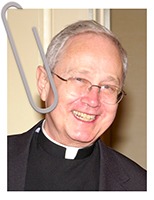Many years ago, Robert Fulghum wrote an insightful book. All I Really Need to Know I Learned in Kindergarten. It described the powerful lessons most of us learned early in our lives.
Either in formal kindergartens or the informal kindergartens of our homes, we learned to
- Share everything.
- Play fair.
- Don’t hit people.
- Put things back where you found them.
- Etc.
Our Lady of Nazareth
I was recently asked to preach on Our Lady of Nazareth at our Marian Shrine. I was not very familiar with this title. It is listed in the revised collection of 46 Marian Masses authorized by Rome. I was also surprised by the number of parishes with the title of Our Lady of Nazareth.
I began to wonder. What did Jesus learn in his equivalent of kindergarten – his home in Nazareth with Mary… and Joseph.
We know they were his main teachers. We don’t know what he may have learned from association with other children his age.
There is so much I don’t know about the family we call The Holy Family and … Our Lady of Nazareth.
What do we know… and not know about the “kindergarten” Jesus experienced?
We “know” very little
All we know from the scriptures is that he grew up in Nazareth. There he “grew in wisdom, age, and grace.” At 12 he already showed knowledge that amazed the teachers. In a sense, this was the informal beginning of his mission.
Everything else we think we know is conjecture!
Our conjectures are often based on our experience of our formative years of children today.
But we don’t really “know” much about either the Holy Family or Our Lady of Nazareth.
What don’t we know?
What were the joys and frustrations of teaching him to walk, to sleep through the night? What were his toys? When did they teach him to say his prayers? Did they teach him to play nice, to forgive others?
What stories and maxims did he learn from them? What did Mary and Joseph teach by their example? They probably went about their lives living according to the strict rule for males and females in a heavily patriarchal society… rules much different from our own!
When did he realize he knew the scriptures better than his first teachers?
How did Jesus arrive at his understanding of “mother and father” as “whoever does the will of my father in heaven.” (Matthew 12:50)
So many questions!
What can we learn from of Our Lady of Nazareth?
I think it is wise to reflect on these words from the missal…
In the holy house of Nazareth as the first disciple of her son, she receives the messages of the Gospel, treasures it in her heart, and reflects on it in her mind.
At Nazareth too, in loving communion with her Son, she watches over the growing Church in the person of her child and hands on to us the shining example of her life.
In all this, she already foreshadows her role after Jesus’ resurrection.
She was with the fearful disciples in the locked upper room. Once again, she pondered so many things in her heart. She, probably better than most, appreciated their transformation through the outpouring of the Spirit God on Pentecost.
Following her model
- Can we learn from his mother Mary openness as the first disciple of her Son?
- With Mary can we see the working of God in confusion and suffering of the church today?
- With Pope Francis can we call on Our Lady of Nazareth to watch over the synodal process today?
PS Dr. King gave the “I have a dream” speech, not the “I have a plan” speech.
It’s dreams that change the course of history.
Click below for an audio version of this Vincentian Mindwalk


RE: Citation from the missal:
“In the holy house of Nazareth as the first disciple of her son, she receives the messages of the Gospel, treasures it in her heart, and reflects on it in her mind.
“At Nazareth too, in loving communion with her Son, she watches over the growing Church in the person of her child and hands on to us the shining example of her life.”
I see in St. Paul VI’s January 5th, 1964 Nazareth address an echo of, and an elaboration on, the missal quote:
“The silence of Nazareth should teach us how to meditate in peace and quiet, to reflect on the deeply spiritual, and to be open to the voice of God’s inner wisdom and the counsel of his true teachers. Nazareth can teach us the value of study and preparation, of meditation, of a well-ordered personal spiritual life, and of silent prayer that is known only to God.
“May Nazareth serve as a model of what the family should be. May it show us the family’s holy and enduring character and exemplify its basic function in society: a community of love and sharing, beautiful for the problems it poses and the rewards it brings, in sum, the perfect setting for rearing children – and for this there is no substitute.
“In Nazareth, the home of a craftsman’s son, we learn about work and the discipline it entails.”